Story and photos by Marina Kazaryan, project assistant, Heifer Georgia.
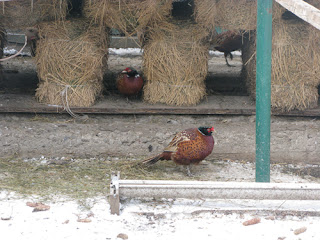 |
| Pheasants. |
As the legend has it, in the 5th centuryA.D. King Vakhtang I Gorgasali was hunting in the woods, when his falcon caughta pheasant. Fighting in the air, both birds fell into a spring nearby and diedbecause the water was boiling hot. Astonished by such unusual naturalphenomenon, King Vakhtang ordered to build a town around the hot springs. Thisis how Tbilisi, the capital of Georgia, came to life. Ever since, pheasants wereconsidered almost as a symbol. However today they are not as easily found inthe natural habitat. So much more curious it is to learn that in a village ofTeleti several kilometers away from Tbilisi there is a farm breeding the wildbirds.
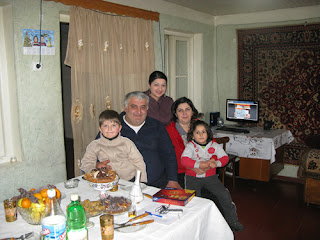 |
| The Laliashvilis family. |
The Laliashvilis are a family of six: Tengiz (40),his wife Ekaterine (37), daughters Teona (18) and Nino (3), son Giorgi (5) andhis mother Zhenia (68). Today they are owners of a developing pheasant farm,being a part of Heifer project. The beginning wasn’t easy though.
Since early youth Tengiz prepared himself for amilitary career. He completed the obligatory military service at 18, and eversince has been in the army serving all around the country. “We wouldn’t see himfor years sometimes”, says his wife Ekaterine. In the last military conflict severalyears ago Tengiz was wounded in the region of heart and was released fromservice. It was then that he decided to start a pheasant farm.
Pheasant breeding is quite an innovative branch ofagriculture in Georgia, Tengiz had to study the habits of the birds, experimentwith food and propagation. But several species that he owned were not enoughfor full-fledged farming. Family’s scarce income which was received fromselling incubators of his own construction could not cover costs for forage andveterinary needs.
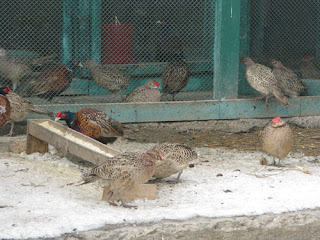 |
| Pheasants in the volary. |
When Tengiz learned about Heifer International’sactivities in Georgia, he immediately decided to join. Here, as in everythingelse, his wife whom he has known since school days stood by his side. WithHeifer’s assistance Tengiz established a Farmers’ Association. Five originalfamilies got 15 “families” of pheasants, each consisting of one male and threefemales, as well as forage and additional training. “In a short period of timeI became quite a celebrity”, says Tengiz laughing. “People would hear about apheasant farm and come to see it, first from the neighboring
villages and thenfrom more distant regions”. Some came as tourists but many got interested inthis new field.
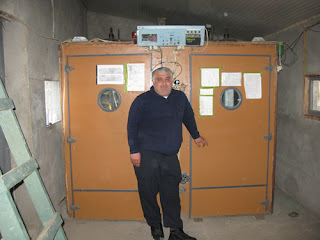 |
| Tengiz near the incubator. |
This year Tengiz has already started the firststage of giving away nestlings in the Pass on Gift tradition of Heifer, andmeanwhile he is already preparing the second generation of receiving families,provides them with training in pheasant breeding and helps building incubators.“It’s a new area and people are eager to get involved because it opens up newopportunities”, explains Tengiz. When correctly treated, pheasants grow quitelarge, have tasty meat and are profitable for sale. Tengiz already has severaloffers for purchase of pheasants. He also wants to prepare a certain part ofbirds for wild nature and release them into their natural environment to restoretheir traditionally large but today considerably decreased population.
Laliashvili’s elder daughter Teona became a studentof pharmaceutics last year, and their son Giorgi will go to school in theautumn. Their living standards have considerably improved, today they can allowthemselves heating and better products. The family has purchased a computerwhich is used for children’s education and for collecting more information onpheasants breeding and treatment. Tengiz built a complex of open-air cageswhere pheasant families can breed. In spring he plans to lay out a gardenaround the cages.
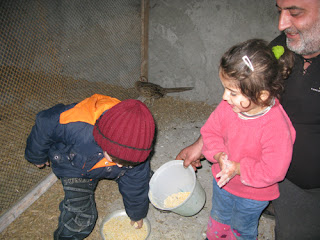 |
|
Tengiz with his children, taking care of the birds.
|
And it is not only economical conditions that haveimproved with the beginning of the project. “When I returned home after theinjury, poor income and unemployment were torturing me”, remembers Tengiz. “Istarted having serious psychological problems. Today I simply have no time for depression”.Everyone in the family have their part in the farm’s everyday life, from theyounger kids to the elderly granny who is very fond of their new inhabitants.Pheasant breeding consumes enough labour, keeping the entire family occupied.Birds must be fed, cages cleaned, eggs collected and you always have to keep aneye on new families to make sure the breeding goes the right way and does notspoil the pedigree.
“After all the difficulties we’ve been through,this farm returned Tengiz to the family”, says Ekaterine. “We will always be gratefulto Heifer International for giving us this opportunity to develop ourinitiative and making us even more united”.




